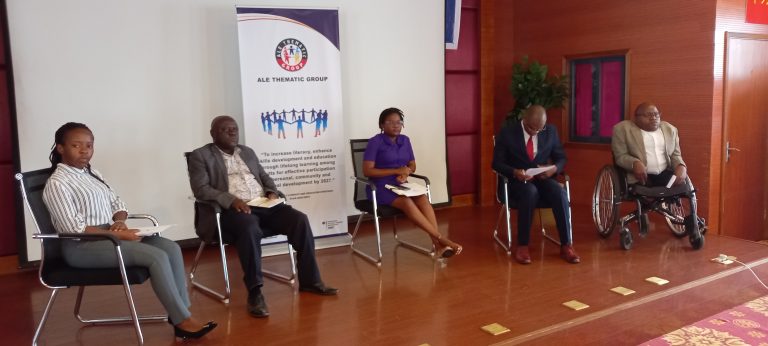Stakeholders come together to promote ALE in Malawi
17 October 2022 | Dyson Mthawanji | DVV International

On 29th September, 2022, various stakeholders from the Adult Learning and Education (ALE) sector in Malawi came together in a roundtable meeting to discuss and promote the sector. This meeting is coming at a time when the country has just approved its first ever National Adult Literacy and Education Policy (NALEP) and National Adult Literacy and Education Strategic Plan (2022-2027).
Speaking during a roundtable panel discussion – the first of its kind for the ALE Thematic Group members in Malawi- the panellists bemoaned poor funding for the ALE sector and little adherence to inclusive education.
Renowned education activist and board chairperson for the Civil Society Education Coalition (CSEC), Dr Limbani Nsapato complained about the lack of political will in Malawi and urged leaders at various levels to push for more funding for the ALE sector.
“In Malawi, there is low investment towards ALE as compared to other forms of education, said Nsapato, who is also the Country Director for Edukans Foundation.
According to the Malawi Housing and Population Census of 2018, up to 4.7 million people are illiterate in Malawi, representing a 31.4% illiteracy rate. Of this number, 1.6 million are women, among whom the illiteracy rate is 34.1%.
Charles Mkunga, the Deputy Director for Community Development at the National Centre for Literacy and Adult Education (NACLAE) - a department under the Ministry of Gender, Community Development and Social Welfare - said the Malawi government is committed to promoting ALE by ensuring that the major challenges are solved. However, he was quick to say this is not the role of government only. “Everyone should take part. ALE is a cross cutting issue, therefore, all stakeholders in all development sectors should come out and join our efforts to promote ALE in Malawi.”
Nsapato concurred with Mkunga by adding that the successful implementation of the NALEP and the ALE Strategic Plan will rely on joint efforts by all stakeholders including chiefs. “The operationalization of these two documents needs our efforts, dedication and lobbying for increased funding. ALE advocacy should be done throughout the year not only when Malawi is commemorating International Literacy Day every September 8th,” said Nsapato.
Like the Marrakech Framework for Action (2022), a key global framework for ALE, and the Sustainable Development Goals, the Malawi National Adult Literacy and Education Strategic Plan also calls for an inclusive approach by all ALE players to accommodate learners irrespective of any individual differences. Commenting in line with these instruments, Mr. Rex Kalima, Executive Director of the Forum for the Development of Youth with Disabilities (FDYD), who was one of the panellists, lamented low prevalence of people with disabilities in adult education classes.
“It is good that a lot of good things are happening in the ALE sector. However, we should do more than this. A lot of people are attending adult learning classes but there are very few people with disabilities. We should make the adult education classes conducive for people with disabilities.”
Malawi, through the National Strategy on Inclusive Education, aims at ensuring that learners with diverse needs in Malawi have equitable access to quality education in inclusive settings at all levels through the removal of barriers to learning, participation, attendance and achievement.
However, Kalima stated that most of the infrastructure in Malawi is not user-friendly for people with disabilities. Kalima’s statement echoes the theme for the 2022 International Literacy Day which was ‘Transforming Literacy Learning Spaces’.
While Kalima lamented that sometimes it is not easy to raise these concerns through the media, Nsapato hailed the media for increased visibility of ALE mainly in recent years.
Another panellist, the Vice Chairperson of the Media Institute for Southern Africa (MISA) Malawi Mandy Pondani, who also works with Malawi’s oldest media house, The Times Group, urged journalists to cover more stories on ALE as it is a key to the development of the country and the realization of Vision 2063, which is the country’s development roadmap.
Also on the panel was Brenda Khwale from the Centre for Human Rights Education Advice and Assistance (CHREAA). She highlighted the value of ALE as a tool to reduce recidivism of those in the penal system in Malawi. CHREAA works in partnership with DVV International and the Malawi Prisons Service providing technical and vocational education to prisoners.
DVV International Regional Director for Southern Africa, David Harrington, hailed the panellists for raising pertinent issues, and for highlighting the challenges faced by the ALE sector, as well as proposing measures to mitigate and even eliminate them.
DVV International has been working in Malawi since 2017. The German organization provides technical and financial support and capacity building to the Malawi Government through National Centre for Literacy and Adult Education (NACLAE). Among various other partnership, DVV International is also providing support to the Catholic University of Malawi (CUNIMA) which is offering the country’s first ever third level qualification in Adult Education and Development.